Congratulation Bethany Lycan on acceptance to the Ph.D. program in Linguistics at the University of New Mexico
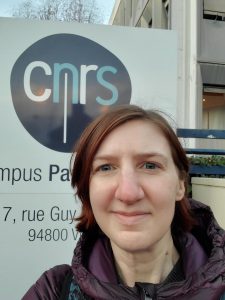 CSULB Linguistics alumna Bethany Lycan reports: In Fall 2021, I will be starting my PhD program in Linguistics at the University of New Mexico, where I will be mentored by Melvatha Chee, head of the Navajo Language Program at UNM. I have been offered the Joseph H Greenberg Fellowship, which provides full funding for four years with an assistantship in the fourth year. While at UNM, I plan to focus on syntax, discourse, and Native American linguistics. Eventually I hope to teach linguistics, conduct research, and be actively involved in a community-based language revitalization program. I am excited to be joining the program at UNM as it has a focus on cognitive-functional linguistics and a long-standing tradition of working with Native American communities.
CSULB Linguistics alumna Bethany Lycan reports: In Fall 2021, I will be starting my PhD program in Linguistics at the University of New Mexico, where I will be mentored by Melvatha Chee, head of the Navajo Language Program at UNM. I have been offered the Joseph H Greenberg Fellowship, which provides full funding for four years with an assistantship in the fourth year. While at UNM, I plan to focus on syntax, discourse, and Native American linguistics. Eventually I hope to teach linguistics, conduct research, and be actively involved in a community-based language revitalization program. I am excited to be joining the program at UNM as it has a focus on cognitive-functional linguistics and a long-standing tradition of working with Native American communities.
Attending the CATESOL OC Chapter Spring 2021 Workshop and Panel Discussion: A Report by Esra Eldem
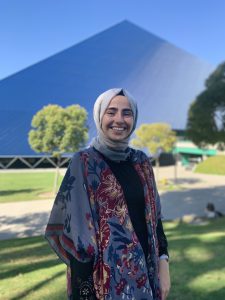 After receiving an announcement email from my graduate advisor two months ago, I submitted an online application and fortunately gained the opportunity to become a recipient of the CATESOL OC Graduate Student Initiative (GSI) Award for Spring 2021. In addition to a free CATESOL student membership and free admission to the CATESOL OC Chapter’s workshop event, this award provided me with the amazing opportunity to more closely learn about the TESOL profession and to establish network with various teachers and scholars. In this report, I will primarily discuss my experiences throughout the event, which took place on February 27, 2021.
After receiving an announcement email from my graduate advisor two months ago, I submitted an online application and fortunately gained the opportunity to become a recipient of the CATESOL OC Graduate Student Initiative (GSI) Award for Spring 2021. In addition to a free CATESOL student membership and free admission to the CATESOL OC Chapter’s workshop event, this award provided me with the amazing opportunity to more closely learn about the TESOL profession and to establish network with various teachers and scholars. In this report, I will primarily discuss my experiences throughout the event, which took place on February 27, 2021.
The CATESOL OC Chapter Workshop and Panel Discussion event was held online this year due to the pandemic. Although online events may sometimes seem to decrease the interaction among the audience, this was not the case for this event. The content and speakers as well as the games and discussions in the breakout rooms were all so intriguing that I did not even realize how fast time went by during the 4-hour program.
The CATESOL OC Chapter’s workshop and panel discussion mainly focused on the topic of online teaching and learning environments, and, particularly, how to plan more dynamic lessons on Zoom. The program started with a fascinating talk by the featured speaker, Savyonne Steindler. Through the presentation by Savyonne Steindler, I learned about various online games and activities specially tailored to the needs of college-level ESL learners. The games ranged from taboo and tic tac toe to information gaps, find someone who, and jigsaws. My background as a TESOL major mainly revolved around learning how to teach unplugged, which is slightly different from what we have to do for the ever-changing needs of learners especially due to the pandemic. For most of the online games that Savyonne Steindler shared with us, I have had experiences and practices only in face-to-face settings. Therefore, I was unsure about how I could manage an online class and create an engaging learning environment. The whole-class and group activities shared by Savyonne Steindler, however, which could be adapted for various classes and proficiency levels, helped me feel more comfortable and confident, as I learned that there is a wide variety of options that I can make use of once I start to teach.
The rest of the program involved a panel, a second presentation, and a series of poster/flipgrid presentations that commonly addressed the challenges in Zoom classroom settings and recommendations for online teaching. During this time, I also had the opportunity to discuss with several professors about my experiences regarding the challenges of online teaching, particularly technical issues that may arise. Gaining the chance to discuss with professors about ESL classes motivated me to gain more knowledge and professionality besides getting more hands-on experience and doing more research on online classes.
Although I currently do not work with ESL learners, I will be applying for ESL instructor positions in the near future in community-based classes. The ideas and activities I learned throughout the event have inspired me to serve my students by creating a more engaging environment in the virtual setting, which I do not see as a barrier to effective teaching anymore. With the help of this event, I believe I can better tailor my classes based on the needs of my students as long as I brainstorm and plan well to make use of available tools and resources.
Besides the great experience of attending this wonderful event, getting free access to the Slangman digital online resource through opportunity drawing was also a very rewarding part! I highly recommend every graduate student in the TESOL field to join and enjoy the amazing atmosphere of ESL discussions and meetings with the experts in the field through CATESOL OC Chapter events.
Linguistics, Anti-Racism, & Social Justice Tiktok Contest
CALL FOR SUBMISSIONS – LINGUISTICS, ANTI-RACISM, & SOCIAL JUSTICE TIKTOK CONTEST
The CSULB Linguistics Department is pleased to announce a contest for TikToks that bring together linguistics, anti-racism, and social justice. Eligible students are invited to create original TikTok content using the #CSULBLingTok hashtag.
This contest will run through the months of February, March, and April. Each month, we will choose the top ~45 submissions to repost on our @csulblinguistics TikTok account. Each approved submission will receive a $25 Amazon gift card. Up to 140 total submissions will be accepted. In addition, the creator of the best TikTok each month will receive a $200 prize, and the 2 runners-up for that month will each receive $150.
What we’re looking for:
Submissions should focus on issues related to language and social justice, broadly defined. We’re especially interested the following genres and topics:
- Anti-racism and language
- Black English/African American English
- Black ASL
- Afro-Latinx language varieties
- Combating myths and stigma about language and race/ethnicity
- Educational videos
- Submissions about languages you speak or sign at home
- Your personal experiences with language and social justice-related issues
Contest details and how to submit:
- Make your video(s), being as creative as you like. Submissions should be both entertaining and factually accurate. Remember that linguistics celebrates linguistic diversity, rather than mocking it! IMPORTANT: For accessibility purposes, you must include accurate captions in all submissions.
- Post your video(s) to your own TikTok account, making sure to use the #CSULBLingTok hashtag AND tag our account (@csulblinguistics).
- For each individual submission, fill out the Qualtrics Form at the following link [https://csulb.qualtrics.com/jfe/form/SV_3eDcF38sQvPfbsW]. (This information is necessary both to verify your eligibility and to distribute your incentive if your video is accepted. Submissions that are missing a matching form entry will not be considered.)
- Make sure to post your videos by the cut-off date for each month’s contest:
Sunday, February 28; Wednesday, March 31; and Friday, April 16. (Note the earlier date for April!)
A committee of Linguistics faculty and students will review all submissions for factual accuracy, educational and entertainment value, and overall good vibes. We will let you know whether your submission has been accepted. At the end of each month, we’ll announce that month’s winning video and the two runners-up.
All accepted submissions will be reposted on our @csulblinguistics TikTok account. In addition, we will post the monthly winners on our departmental website and social media pages.
While you can submit an unlimited number of videos, there is a limit of 1 $25 participant incentive per person.
Eligibility:
You must be a currently enrolled CSULB student to participate. Eligibility is limited to only those students who were enrolled in any graduate or undergraduate LING or ASLD class during Fall 2020 or Spring 2021 (including cross-listed sections under ANTH, ENG, or WGSS).
Important things to remember:
- Please make sure that your videos are publicly viewable, available to save, and available to Stitch and Duet.
- Don’t forget to use the #CSULBLingTok hashtag and tag us @csulblinguistics so that we can see your content.
- You are also welcome to include hashtags like #linguistics, #linguisticsmemes, and #socialjustice, as well as hashtags related to the languages/varieties mentioned in your submission, but this is not required.
- Remember that all submissions must be accurately captioned to be considered!
- Make sure that your posts follow the TikTok community guidelines.
- Examples of linguistics TikToks we like: here and here and here
For more information, please contact cla-linguistics@csulb.edu.
Alumni Return! Experiences and Careers with a Linguistics Degree
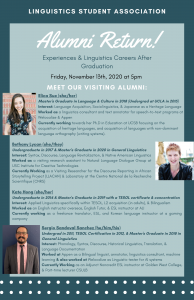 This Friday, November 13th, 2020 at 5pm the Linguistics Student Association will be hosting an Alumni Return! Experiences and Careers with a Linguistics Degree, where you’ll be able to come listen and ask questions to some our linguistics alumni in relation to their experiences after graduating, the careers they have gone onto, as well as their plans toward future careers with their earned linguistics degree.
This Friday, November 13th, 2020 at 5pm the Linguistics Student Association will be hosting an Alumni Return! Experiences and Careers with a Linguistics Degree, where you’ll be able to come listen and ask questions to some our linguistics alumni in relation to their experiences after graduating, the careers they have gone onto, as well as their plans toward future careers with their earned linguistics degree.
Attached is a flyer that specifies into the details of our alumni’s interests and experiences in linguistics and linguistic careers. We’ll be recording the event, so if you are not able to attend the event and would like us to ask our panelists questions on your behalf, simply let us know your questions at the google form below.
Note: All who are interested in receiving access of the event recording (and those of any of our other events) should fill this form out, so we can add your information to our club’s BeachBoard roster.
https://docs.google.com/forms/d/e/1FAIpQLSdHvWBiBYXEtbqKEToWCabdYgmS4hNIE4Hyu6YcczOpq4Cb_A/viewform?usp=sf_link
To join this event and the rest of our semester’s meetings, please register at this ZOOM link (if you haven’t already done so):
https://csulb.zoom.us/meeting/register/tJIoduCrqzgtHtEadb4sFxsUDfSfOT-pbpZY
After registering, you will receive a confirmation email containing the Zoom link that will work for all our meetings the rest of the semester.
Linguistics Research Showcase (Call for Research Presenters!)
The CSULB Linguistics Student Association (LSA) will be hosting an informal Linguistics Research Showcase on December 4th at 5pm for us to really get a time to appreciate all our unique interests and directions in the linguistics field. This will give you the opportunity to share your up-and-coming research with fellow students and faculty in a 10-15 minute presentation, along with a question-and-answer portion afterwards.
Whether you are an undergraduate or graduate student, all research projects are open to applying and presenting, even those that are still “in-progress” or not yet completed. We’d still love to hear what you have done and where you expect the project will go or find out, even if you haven’t had the chance to conduct more yet.
This is a great opportunity to build on your resume or CV, exemplifying your initiative to take your project beyond the classroom requirement as well as that you have experience presenting on your work.
Are you interested in being one of our presenters? Simply submit the application link below by Sunday, November 15th, 11:59 PM (deadline):
https://docs.google.com/forms/d/e/1FAIpQLScBvaqOmH3qgyWwLhMsASGy4YEYUTHZf0HIR5PdDgT9F6gYNQ/viewform?usp=sf_link
If you need any help in the application process, we’re here to help! We will be having a workshop soon devoted to writing abstracts for this application, but also you can stop by CSULB’s Learning Center, Writing Center, or Graduate Student Resource Center in the meantime as well, if the workshop might not work with your schedule. These are free tutoring services on campus that can help you prepare for applications, finish/review course assignments, as well as assist in any other projects involving speaking or writing.
The LSA group and its community of students can also be contacted through the following means, if you have any questions about the application or event details:
Email: csulb.lingstudents@gmail.com
Instagram: @CSULB_LSA
Facebook Group: CSULB Linguistics Student Association
Discord Server: https://discord.gg/DjUk3GQ
Linguistics Tutoring
The Linguistics department offers tutoring for students enrolled in LING courses. This semester, tutoring services will be coordinated by graduate assistant Cy Casprowiak. Cy will offer regular tutoring from 1-2 on Mondays and Thursdays, and she will also handle referrals to other graduate assistants for students who need specialized topics or other time-slots.
For tutoring session, please e-mail CLA-Linguistics.Tutoring@csulb.edu with the class and subject matter you would like to cover, and your time availability. Cy or one of the other graduate assistants will be in contact with you to set up a Zoom meeting.
Congratulation Aziz Qureshi on acceptance to the Ed.D. program in Educational Leadership at CSULB
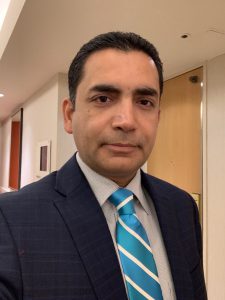 Aziz Qureshi graduated with Masters in Linguistics and a Graduate Certificate in TESOL from CSULB in 2012. Currently, he is working as an ESL lecturer at the American Language Institute, CSULB and a Continuing Lecturer in the Program in Academic English at UCI. He has recently been admitted to the EdD program in Educational Leadership at CSULB. As a doctoral student, his areas of interest include the challenges faced by non-native English-speaking teachers and international students in the United States.
Aziz Qureshi graduated with Masters in Linguistics and a Graduate Certificate in TESOL from CSULB in 2012. Currently, he is working as an ESL lecturer at the American Language Institute, CSULB and a Continuing Lecturer in the Program in Academic English at UCI. He has recently been admitted to the EdD program in Educational Leadership at CSULB. As a doctoral student, his areas of interest include the challenges faced by non-native English-speaking teachers and international students in the United States.
Check out an amazing interview of one of our Linguistics MA alumni, Stacey Jacobson
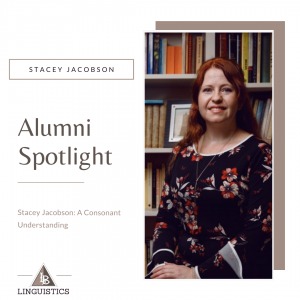 Check out an amazing interview of one of our Linguistics MA alumni, now doing her PhD at the University of Alabama
Check out an amazing interview of one of our Linguistics MA alumni, now doing her PhD at the University of Alabama
Statement of Solidarity with “Black Lives Matter”
The faculty in the Linguistics Department at the California State University are anguished by the brutal murder of George Floyd at the hands of a police officer on May 25, 2020 in Minneapolis. This murder was not an isolated instance but the latest in an endless litany of police violence against the lives of Black Americans that serves to highlight the racist societies in which we live. We stand in solidarity with the “Black Lives Matter” movement in the quest for social justice, condemnation of police brutality, and the enduring struggle against institutional racism.
As members of the linguistics faculty, we approach language as a powerful form of social action and as a tool for learning how everyday language stratifies people and reproduces both overt and covert forms of racism against linguistic and ethnic minorities, and Black people, in particular. In upholding the humanitarian principles of egalitarianism, civil, linguistic and socioeconomic parity, the faculty pledge to examine our own role in perpetuating white supremacy as a department to identify and work to dismantle systems of oppression. We encourage all of our students to engage in similar discussions in their communities, and with us at the departmental and university level .
We promote social equity and justice for all, particularly those who have been adversely affected by the legacy and history of racism. Martin Luther King declared that “The arc of the moral universe is long, it bends toward justice.” Although it has taken centuries, we feel encouraged that a global movement is now gaining momentum against repressive ideologies of state violence, discourses of subordination, marginalization, and exclusion that stem from pervasive ideals of white supremacy.
Finally, we reaffirm our support for change at linguistic, sociocultural and educational levels. We are strong advocates for linguistic rights and language access for all communities, and we believe that discursive change and institutional change go hand in hand. We express our solidarity with the growing anti-racist protests and their humanitarian ideals for transformation as these protests and demonstrations are swiftly spreading beyond the United States, connecting the enduring struggles of Black communities and those of oppressed communities throughout the world.
College of Liberal Arts 2020 Best Master’s Thesis
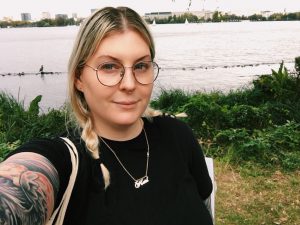 Congratulations Kari Spector on winning the College of Liberal Arts 2020 Best Master’s Thesis.
Congratulations Kari Spector on winning the College of Liberal Arts 2020 Best Master’s Thesis.
In her thesis research, Kari analyzed data obtained from Deaf-parented elementary school-aged children who can hear, referred to as Koda. The participants are fluent in English and American Sign Language (ASL), also known as bimodal bilinguals.
She studied their narratives, focusing on code-blending and semantic propositions. She found that the children were more likely to produce single-sign code-blends with verbs as opposed to nouns, similar to what previous studies have found with adults. She also found cases where children produced multi-sign code-blends containing more than one verb. This could be a verb and depictive verb blended in the same utterance, two separate verbs blended in the same sentence, or verb repetition in which speech matched the aspectual morphology of the sign. The results echo findings on bimodal bilingual toddlers—as the children increase in age, the amount of code-blended utterances increases as well.
Kari recently presented her thesis research with Dr. Wanette Reynolds at the Theoretical Issues in Sign Language Research conference in Hamburg, Germany (pictured).
